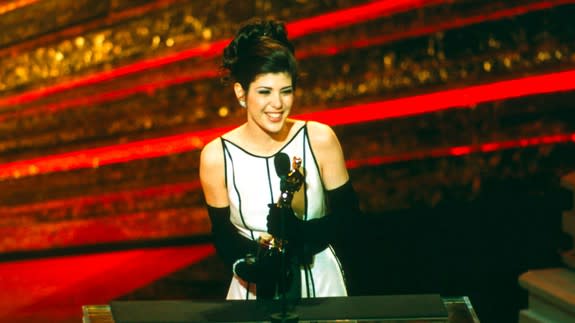Celebrity conspiracy theory: Marisa Tomei wasn't supposed to win an Oscar

Welcome to Celebrity Conspiracy Theory, Mashable's new series in which we investigate the internet's most perplexing theories about famous people.
It's a moment immortalized by memes: Steve Harvey, host of the 2015 Miss Universe pageant, was forced to take the victory crown away from Miss Colombia Ariadna Gutiérrez — whom he had mistakenly announced as the victor — and regift it to Miss Phillippines Pia Wurtzbach, the actual winner.
But what if he just, you know, hadn't? What if he'd simply slunk off, embarrassed, into the wings? What if he let Gutiérrez celebrate, leaving the audience and contestants completely unaware of the rightful winner?
According to an extraordinarily pervasive myth, that's exactly what happened to Marisa Tomei.
SEE ALSO: Michael Jackson's daughter, Paris, is certain he was murdered
Marisa Tomei took home the trophy for Best Supporting Actress at the 1993 Academy Awards for her performance in My Cousin Vinny. At that point, Tomei was a relative newcomer with only five movies on her resume, and was not considered the favorite to win. In fact, many critics were all in for Joan Plowright in Enchanted April (a movie that no one remembers but that sounds very Oscar-worthy), or Vanessa Redgrave in Howards End.
But win Tomei did — a surprise to nearly everyone. How lucky she was that Twitter did not exist in 1993.
But a year later, a rumor — one that Tomei would later call "hurtful" — started to circulate. There was no way, people opined, that a performance in My Cousin Vinny (which Roger Ebert called "the kind of movie home video was invented for") could have really beaten all the serious actresses in films-films. It must have been a mistake.
Judging by detailed investigations from both Snopes and Gawker, the theory can be traced back to a piece printed by the Hollywood Reporter in 1994. "A rumor has been making the rounds in Manhattan..." it read, "...that last year Marisa Tomei received her Oscar statue by error, with a resultant scandal about it soon to be exposed, much to the shame of the Academy."
Rumor had it that during the ceremony, presenter Jack Palance found himself unable to read the name on the winner's card. Momentarily flustered, he instead called out the last nominee name listed on the teleprompter.
Surprise! It was Marisa Tomei.
Of course, the Hollywood Reporter made it clear that it didn't support the rumor. So did Entertainment Weekly, which also reported on the theory. But by giving voice to whispers most people likely hadn't heard anyway, the two publications kept the rumor mill running. Finally, in a 1997 interview with Geraldo Rivera, Observer film critic Rex Reed endorsed the theory, contending that Palance was intoxicated during the broadcast and that the Academy assembled a "massive cover-up" for his alleged gaffe.
But, as one might guess, the evidence is not on Reed's side. For one thing, the Academy flat-out denied the allegations, insisting that two representatives from Price Waterhouse (the company that tabulated the Oscar votes) stand ready to intervene during the show in the case of an error.
And how could the Price Waterhouse guys resist a second appearance on stage? After all, they only get to speak out loud just one day a year. (Hang in there, guys, this year's Oscars are coming up soon.)
Footage from the 1993 broadcast, now widely available on YouTube, further discounts the theory. While Palance does pause before announcing Tomei's name, he's clearly reading from the winner card. If anything, he needed a pair of fashionable reading glasses, not a rebuke from the international film community.
So why has this easily-debunked rumor been so prevalent for years? Why is it still pervading internet roundups and explainers today?
Because the theory is just plausible enough to be attractive as hell. Palance bumbles endearingly through the presentation, calling an Australian actress British and taking several pauses that are just a bit too long. Tomei was also a massive underdog: the other actresses in her category towered over her in prestige. To someone who wants to believe, the whole spiel is fairly easy to reason out. Plus, as we all know from Miss Universe 2015, it's a little fun to watch celebrities make mistakes.
But it's also worth considering how the rumor spread: through print magazines. Lost was the opportunity to meme, to tweet, to painstakingly evaluate Palance's behavior frame-by-frame — in 1993, the internet as we know it just a glimmer in some programmer's eye.
Consider, for example, just how much space on the internet is reserved for the rumor that Beyoncé faked her pregnancy, how many screengrabs and slo-mo shots of Bellygate have been plastered in front of our eyes while we're just trying to find some cute pics of Blue Ivy. While that theory still has its devotees, it's mostly old news to the internet, which has moved on to brighter horizons like how much Kylie Jenner loves Chemtrails and whether Taylor Swift is a Satanist.
For poor, sweet Tomei, there was no such opportunity.
So, no, Marisa Tomei was not the Ariadna Gutiérrez of 1993. She got to keep her trophy, and — in a true 2-for-1 victory — she and Palance managed to evade the Twitterverse.
Well, kind of.
MARISA TOMEI DIDN'T REALLY WIN HER OSCAR pic.twitter.com/uOcdOprbNR
— Blake Parker (@blakeaparker) August 13, 2016
